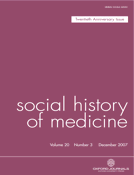-
Views
-
Cite
Cite
David S. Parker, Civilizing Argentina: Science, Medicine, and the Modern State, Social History of Medicine, Volume 20, Issue 3, December 2007, Pages 624–625, https://doi.org/10.1093/shm/hkm089
Close - Share Icon Share
Extract
In late nineteenth- and early twentieth-century Argentina, as in much of the West, the emergence of the ‘social question’ went hand-in-hand with the scientific revolution and the rising power of new medical-legal bureaucracies. Specialists in hygiene, epidemiology, psychiatry, puericulture (the science of child-rearing), criminology, forensic medicine and other related fields came to dominate an increasingly medicalised debate about the causes and control of crime, mental illness, alcoholism, prostitution, labour unrest and other social ills. Rising to influence in the Academy, colonizing new organs of the State, and launching a host of scholarly publications for the diffusion of their latest scientific theories, a relatively small cadre of experts came to dominate public discourse on issues ranging from the proper construction of sewers to the proper roles of men and women in marriage. Central to their vision was a preoccupation with improving the national race and staving off the forces of ‘degeneration’. In Civilizing Argentina, Julia Rodriguez provides a sweeping yet detailed look at the kinds of debates and policy prescriptions that dominated the writings of Argentina's medical-legal experts. The key figures in her account include men like José Ingenieros, José Maria Ramos Mejía, Francisco de Veyga, Eusebio Gómez and fingerprinting expert Juan Vucetich. Her research is based primarily on the intensive reading of Argentine legal and medical journals, such as the Archivos de Psiquiatría, Criminología y Ciencias Afines, Revista de Criminología, Psiquiatría y Medicina Legal, Revista Penitenciaría and Revista Jurídica, among others.




